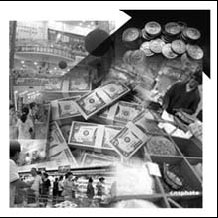A specter is haunting the world - inflation. For the whole of this year, the world's business press has reported price rises in oil and energy, in key minerals and materials, in agricultural products, and in property.

The question people asked in the early months of 2007, whether the Chinese economy was developing too quickly or was too hot, has been answered. Today, there is no more uncertainty - the central government has decided to adopt a tight monetary policy, i.e. shifting to a low gear, not used for the last decade.
Last week, soon after November's consumer price index was announced - an annualized 6.9 percent rise - the central bank raised interest rates, the sixth time this year.
Just as people asked how fast is too fast, this time, they will soon face the question of how tight is too tight. The trick in running a tight economy is not to try to cap all prices, but to be selective.
There may be a risk in setting a too low, an unrealistic target for the overall price index. When inflation is an international phenomenon, and at the same time as the renminbi keeps rising against the dollar, little can be done to ward off the specter.
However, once it has become inevitable, inflation can also be used as an opportunity - by loosening the grip on some sectors of the economy. This is one way to phase out the less competitive and wasteful sectors.
In order to give a boost to the economy's overall efficiency, Beijing will have to let domestic energy prices make a timely response to the world market, and be courageous enough to raise taxes on energy and other resources.
There will have to be a new criteria for measuring business sustainability, so that the companies that can meet it have better access to the financial markets.
There will also have to be large government-funded projects. They are important for creating new jobs. The traditional pet projects of regional officials, most annoyingly thermal power stations and investment parks, must be made to undergo a stricter approval process.

At a recent economics seminar, Professor Liu Wei of Peking University raised a good point by saying that, at a time of inflation, the Chinese manufacturing sector is still in a deflationary cycle. Inflation so far has largely been as a result of rising food prices, he noted, while the prices for manufactured goods have generally been on the decline.
Due to the weak dollar, competition from countries with low wages, and the tough standards of importers, the Chinese manufacturing sector has had little room to shift its increasing costs - materials and energy - to the prices of their products. Profits are paper-thin, one stationary exporter recently complained to me.
Many manufacturers are in a net loss. My friends in business have told me about factory and warehouse owners leaving or selling their properties on the outskirts of Shanghai, which formerly made or handled textiles for the North American market.
All of a sudden, manufacturing has become a difficult business in China when taking into account the immense cuts in export rebates, and stricter new regulations for foreign direct investment.
There has been little discussion about how China is going to deal with these complications. But somewhere down the road, most likely in May, they will surface in the business press, leading to further readjustments. After allchanging to low gear is different from hitting the brakes.
E-mail: younuo@chinadaily.com.cn
(China Daily 12/24/2007 page4)

